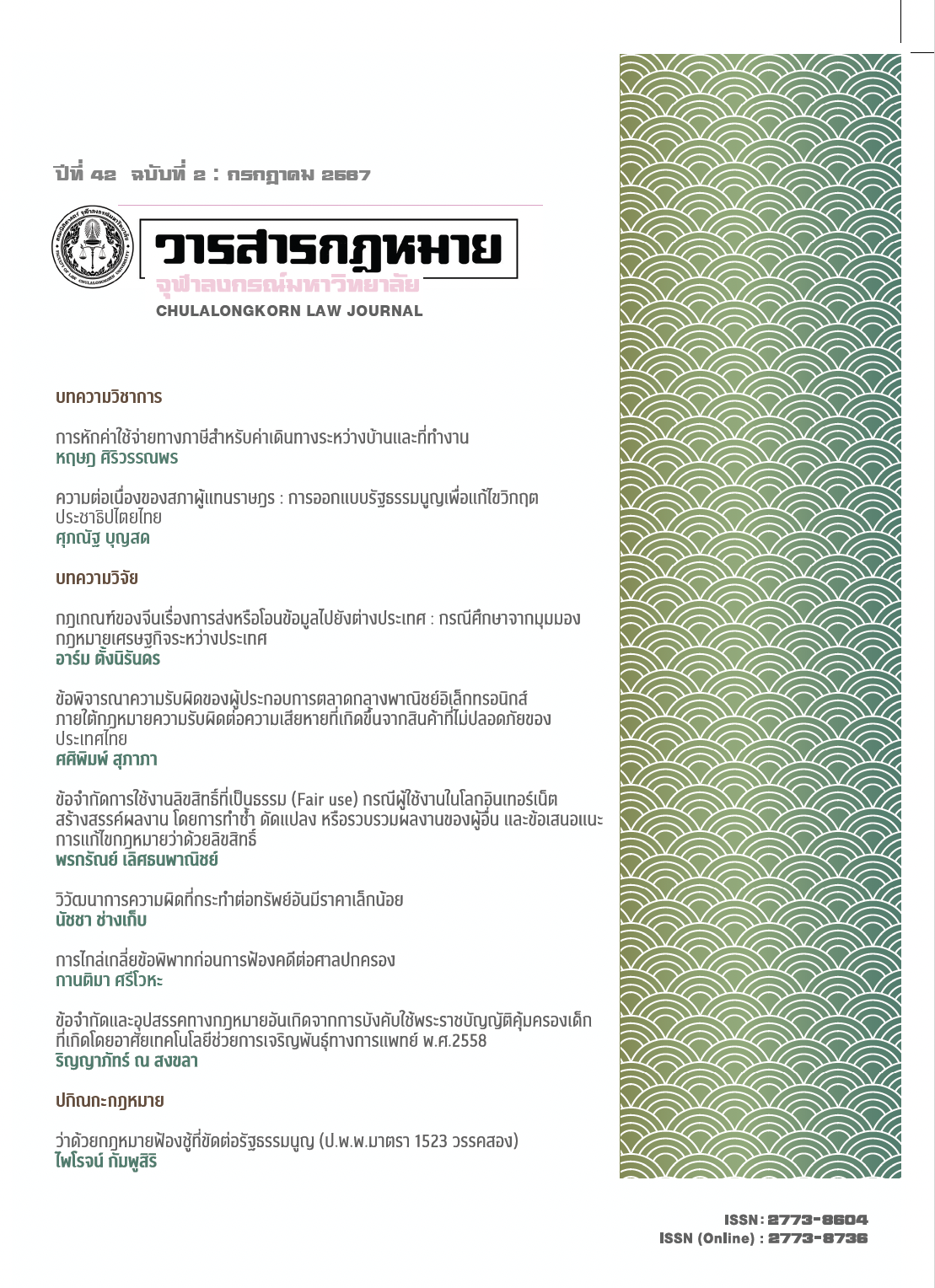ความต่อเนื่องของสภาผู้แทนราษฎร : การออกแบบรัฐธรรมนูญเพื่อแก้ไขวิกฤตประชาธิปไตยไทย
Main Article Content
บทคัดย่อ
บทความวิชาการชิ้นนี้มุ่งเน้นศึกษาสภาพปัญหาเกี่ยวกับกฎเกณฑ์การเข้าดำรงตำแหน่งและพ้นจากตำแหน่งของสภาผู้แทนราษฎรภายหลังการดำรงวาระครบระยะเวลาตามรัฐธรรมนูญกำหนดและการประกาศยุบสภาที่ทำให้เกิดช่วงเวลาการว่างเว้นของสภาผู้แทนราษฎรในระบบกฎหมายเป็นระยะเวลายาวนาน โดยไม่มีองค์กรใดเข้ามารักษาการแทนเพื่อปฏิบัติหน้าที่สภาผู้แทนราษฎรและรัฐสภาในช่วงเวลาที่ดำเนินการจัดให้มีการเลือกตั้งและการเข้าปฏิบัติหน้าที่ของสภาผู้แทนราษฎรชุดใหม่ สำหรับการศึกษาสภาพปัญหาดังกล่าวอาศัยทฤษฎีความต่อเนื่องของรัฐมาประกอบในการพิจารณา โดยผลการศึกษาพบว่าสภาพปัญหาดังกล่าวได้นำมาสู่ปัญหาทางรัฐธรรมนูญสำคัญสองประการ คือ ปัญหาความไม่ต่อเนื่องในการปฏิบัติภารกิจของรัฐและวิกฤตทางรัฐธรรมนูญที่เกิดขึ้นในช่วงเวลาดังกล่าว ด้วยเหตุนี้จึงต้องมีการปรับปรุงกฎเกณฑ์ดังกล่าวให้เกิดความต่อเนื่องระหว่างสภาผู้แทนราษฎรชุดเดิมกับชุดใหม่เกิดขึ้น โดยกำหนดให้หากเป็นกรณีที่ดำรงตำแหน่งครบวาระตามที่รัฐธรรมนูญกำหนดจะต้องมีการดำเนินการจัดการเลือกตั้งสภาผู้แทนราษฎรชุดใหม่ให้เสร็จสิ้นก่อนสภาผู้แทนราษฎรชุดเดิมดำรงตำแหน่งครบวาระและหากเป็นกรณีที่มีการยุบสภาผู้แทนราษฎรต้องกำหนดให้สภาผู้แทนราษฎรชุดเดิมรักษาการแทนต่อไปจนกว่าที่สภาผู้แทนราษฎรชุดใหม่จะเข้าปฏิบัติหน้าที่เพื่อพิทักษ์ระบอบประชาธิปไตยมิให้ล่มสลายลงในช่วงเวลาดังกล่าวเฉกเช่นเดียวกับปี พ.ศ. 2549 และ พ.ศ. 2557
Article Details

อนุญาตภายใต้เงื่อนไข Creative Commons Attribution-NonCommercial-NoDerivatives 4.0 International License.
ลิขสิทธิ์และเนื้อหาในเว็บไซต์ของวารสารกฎหมาย (รวมถึง โดยไม่จำกัดเฉพาะ เนื้อหา รหัสคอมพิวเตอร์ งานศิลป์ ภาพถ่าย รูปภาพ ดนตรีกรรม โสตทัศนวัสดุ) เป็นกรรมสิทธิ์ของวารสารกฎหมาย และผู้ได้รับการโอนสิทธิทุกราย
1. วารสารกฎหมาย ให้อนุญาตให้คุณใช้สิทธิอันไม่เฉพาะเจาะจงที่สามารถถูกถอนเมื่อใดก็ได้ โดยไม่มีค่าใช้จ่าย ในการ
- เยี่ยมชมเว็บไซต์และเอกสารในเว็บไซต์นี้ จากคอมพิวเตอร์หรือเครื่องมือสื่อสารผ่านเว็บบราวเซอร์
- คัดลอกและจัดเก็บเว็บไซต์และเอกสารในเว็บไซต์นี้บนลงคอมพิวเตอร์ของคุณผ่านระบบความจำ cache
- สั่งพิมพ์เอกสารจากเว็บไซต์นี้สำหรับการใช้ส่วนตัวของคุณ
- ผลงานที่ได้รับการตีพิมพ์โดยวารสารกฎหมาย จุฬาลงกรณ์มหาวิทยาลัย ถูกคุ้มครองภายใต้ Creative Commons Attribution 4.0 International License ซึ่งอนุญาตให้ทุกคนสามารถคัดลอก แจกจ่าย ดัดแปลง ส่งต่อ ผลงานได้ ก็ต่อเมื่อผลงานและแหล่งข้อมูลได้รับการอ้างอิงอย่างเหมาะสม
2. วารสารกฎหมาย จุฬาลงกรณ์มหาวิทยาลัย สงวนสิทธิ์ไม่อนุญาตให้คุณใช้สิทธิอื่นใดที่เกี่ยวข้องกับเว็บไซต์และเอกสารบนเว็บไซต์นี้ เช่น การคัดลอก ดัดแปลง เปลี่ยนแปลง ส่งต่อ ตีพิมพ์ แจกจ่าย เผยแพร่ จัดแสดงในที่สาธารณะ ไม่ว่าจะในรูปแบบใดก็ตาม ซึ่งเว็บไซต์หรือเอกสารบนเว็บไซต์ โดยไม่อ้างอิงถึงแหล่งข้อมูลหรือโดยไม่ได้รับอนุญาตเป็นลายลักษณ์อักษรจากวารสารกฎหมาย จุฬาลงกรณ์มหาวิทยาลัย
3. คุณอาจขออนุญาตที่จะใช้เอกสารอันมีลิขสิทธิ์บนเว็บไซต์นี้โดยการเขียนอีเมลล์มายัง journal@law.chula.ac.th
4. วารสารกฎหมาย จุฬาลงกรณ์มหาวิทยาลัย เข้มงวดกับการคุ้มครองลิขสิทธิ์อย่างมาก หากวารสารกฎหมาย จุฬาลงกรณ์มหาวิทยาลัยพบว่าคุณได้ใช้เอกสารอันมีลิขสิทธิ์บนเว็บไซต์นี้โดยไม่ถูกต้องตามการอนุญาตให้ใช้สิทธิ ดังที่กล่าวไปข้างต้น วารสารกฎหมาย จุฬาลงกรณ์มหาวิทยาลัยอาจดำเนินคดีตามกฎหมายต่อคุณได้ เพื่อเรียกร้องค่าเสียหายที่เป็นตัวเงินและคำขอชั่วคราวให้คุณหยุดการใช้เอกสารดังกล่าว ทั้งนี้ คุณอาจถูกสั่งให้ชดใช้ค่าใช้จ่ายใดๆ ที่เกี่ยวข้องกับการดำเนินการตามกฎหมายนี้
หากคุณพบเห็นการใช้เอกสารอันมีลิขสิทธิ์ของวารสารกฎหมาย จุฬาลงกรณ์มหาวิทยาลัย ที่ขัดหรืออาจขัดต่อการอนุญาตให้ใช้สิทธิดังที่ได้กล่าวไปข้างต้น โดยเชื่อว่าได้ละเมิดลิขสิทธิ์ของคุณหรือของผู้อื่น สามารถร้องเรียนมาได้ที่ journal@law.chula.ac.th
เอกสารอ้างอิง
“แถลงการณ์ คณะปฏิรูปการปกครองในระบอบประชาธิปไตยอันมีพระมหากษัตริย์ทรงเป็นประมุข,” ราชกิจจานุเบกษา เล่มที่ 123 ตอนที่ 95 ก, วันที่ 20 กันยายน 2549
“แถลงการณ์สำนักนายกรัฐมนตรี เรื่อง การยุบสภาผู้แทนราษฎรและการกำหนดวันเลือกตั้ง,” ราชกิจจานุเบกษา เล่มที่ 123 ตอนพิเศษที่ 23 ก, วันที่ 24 กุมภาพันธ์ 2549
“ประกาศคณะรักษาความสงบแห่งชาติ ฉบับที่ 1/2557 เรื่อง การควบคุมอำนาจปกครองประเทศ,” ราชกิจจานุเบกษา เล่มที่ 131 ตอนพิเศษที่ 83 ง, วันที่ 22 พฤษภาคม 2557
“พระราชกฤษฎีการยุบสภาผู้แทนราษฎร พ.ศ. 2549,” ราชกิจจานุเบกษา เล่มที่ 123 ตอนที่ 20 ก, วันที่ 24 กุมภาพันธ์ 2549
“พระราชกฤษฎีการยุบสภาผู้แทนราษฎร พ.ศ. 2556,” ราชกิจจานุเบกษา เล่มที่ 130 ตอนที่ 155 ก, วันที่ 9 ธันวาคม 2556
Alf Ross, “On the Concepts “State" and "State Organs” in Constitutional Law”, in Scandinavian Studies in Law, 5 (October 1961): 111-130.
Anthony W. Bradley and Cesare Pinelli, “Parliamentarism,” in The Oxford Handbook of Comparative Constitutional Law, eds. Michel Rosenfeld and Andras Sajo (Oxford: Oxford University Press, 2012)
Article 24 of Finland’s Constitution
Article 32 Part 4 of Denmark’s Constitution
Article 39 of The Basic Law for the Federal Republic of Germany
Article 41 of Japan’s Constitution
Article 42 of Japan’s Constitution
Article 43 of Japan’s Constitution
Article 45 of Japan’s Constitution
Article 46 of Japan’s Constitution
Article 53 of Greece’s Constitution
Article 54 of Japan’s Constitution
Article 61 of Italy’s Constitution
Article 63 and Article 67 of The Basic Law for the Federal Republic of Germany
Article 64 of Netherlands’ Constitution
Article 68 of Spain’s Constitution
Article 77 of The Basic Law for the Federal Republic of Germany
Article 78 of Cambodia’s Constitution
Chris Baker and Pasuk Phongpaichit, A History of Thailand, (Cambridge: Cambridge University Press, 2022)
Donald P. Kommers, The Constitutional Jurisprudence of the Federal Republic of Germany, (London: Duke University Press, 1989)
Economist Intelligence Unit (EIU), Democracy Index 2022: Frontline Democracy and the Battle for Ukraine, (London: The Economist Intelligence Unit Limited, 2023)
Elisabeth Zoller, Introduction to Public Law: A Comparative Study, (Leiden: Martinus Nijhoff Publishers, 2007)
Eugenie Merieau, “Thailand’s Deep State, Royal Power and the Constitutional Court (1997–2015)”, in Journal of Contemporary Asia, 46, 3 (August 2016): 455-466.
Olivier Beaud, “Conceptions of the State,” in The Oxford Handbook of Comparative Constitutional Law, eds. Michel Rosenfeld and Andras Sajo (Oxford: Oxford University Press, 2012)
Samuel Issacharoff, Fragile Democracies : Contested Power in the Era of Constitutional Courts, (New York: Cambridge University Press, 2015)
Sanford Levinson and Jack M. Balkin, “Constitutional Crises”, in University of Pennsylvania Law Review, 157, 3 (February 2009): 707-753.
Thongchai Winichakul, “Thailand’s Royal Democracy in Crisis,” in After the Coup: The National Council for Peace and Order Era and the Future of Thailand, eds. Michael J Montesano, Terence Chong, and Shu Xun Mark Heng (Singapore: ISEAS Publishing, 2019)
Werner Heun, The Constitution of Germany, (Oxford: Hart Publishing, 2011)
ฐากูร ศิริยุทธ์วัฒนา, การคัดค้านผลการเลือกตั้งโดยผู้มีสิทธิเลือกตั้ง, (กรุงเทพมหานคร: สถาบันพระปกเกล้า, 2561)
ทศพล แสงสวัสดิ์, หลักการพื้นฐานแห่งกฎหมายรัฐธรรมนูญ, (กรุงเทพมหานคร: วิญญูชน, 2566)
มาตรา 101 รัฐธรรมนูญแห่งราชอาณาจักรไทย พุทธศักราช 2560
มาตรา 102 และมาตรา 103 รัฐธรรมนูญแห่งราชอาณาจักรไทย พุทธศักราช 2560
มาตรา 104 รัฐธรรมนูญแห่งราชอาณาจักรไทย พุทธศักราช 2560
มาตรา 106 รัฐธรรมนูญแห่งราชอาณาจักรไทย พุทธศักราช 2550
มาตรา 114 รัฐธรรมนูญแห่งราชอาณาจักรไทย พุทธศักราช 2560
มาตรา 118 รัฐธรรมนูญแห่งราชอาณาจักรไทย พุทธศักราช 2540
มาตรา 129 มาตรา 150 มาตรา 151 และมาตรา 152 รัฐธรรมนูญแห่งราชอาณาจักรไทย พุทธศักราช 2560
มาตรา 133 มาตรา 136 มาตรา 137 มาตรา 138 มาตรา 139 และมาตรา 141 รัฐธรรมนูญแห่งราชอาณาจักรไทย พุทธศักราช 2560
มาตรา 156 รัฐธรรมนูญแห่งราชอาณาจักรไทย พุทธศักราช 2560
มาตรา 158 ประกอบด้วยมาตรา 159 รัฐธรรมนูญแห่งราชอาณาจักรไทย พุทธศักราช 2560
มาตรา 158 มาตรา 167 และมาตรา 170 รัฐธรรมนูญแห่งราชอาณาจักรไทย พุทธศักราช 2560
มาตรา 158 รัฐธรรมนูญแห่งราชอาณาจักรไทย พุทธศักราช 2560
มาตรา 16 และมาตรา 17 รัฐธรรมนูญแห่งราชอาณาจักรไทย พุทธศักราช 2560
มาตรา 162 รัฐธรรมนูญแห่งราชอาณาจักรไทย พุทธศักราช 2560
มาตรา 168 และมาตรา 169 รัฐธรรมนูญแห่งราชอาณาจักรไทย พุทธศักราช 2560
มาตรา 168 และมาตรา 170 (3) รัฐธรรมนูญแห่งราชอาณาจักรไทย พุทธศักราช 2560
มาตรา 18 รัฐธรรมนูญแห่งราชอาณาจักรไทย พุทธศักราช 2560
มาตรา 181 รัฐธรรมนูญแห่งราชอาณาจักรไทย พุทธศักราช 2550
มาตรา 2 รัฐธรรมนูญแห่งราชอาณาจักรไทย พุทธศักราช 2560
มาตรา 208 รัฐธรรมนูญแห่งราชอาณาจักรไทย พุทธศักราช 2560
มาตรา 21 รัฐธรรมนูญแห่งราชอาณาจักรไทย พุทธศักราช 2560
มาตรา 214 รัฐธรรมนูญแห่งราชอาณาจักรไทย พุทธศักราช 2560
มาตรา 215 รัฐธรรมนูญแห่งราชอาณาจักรไทย พุทธศักราช 2540
มาตรา 218 ประกอบด้วยมาตรา 208 และมาตรา 209 รัฐธรรมนูญแห่งราชอาณาจักรไทย พุทธศักราช 2560
มาตรา 218 ประกอบด้วยมาตรา 214 รัฐธรรมนูญแห่งราชอาณาจักรไทย พุทธศักราช 2560
มาตรา 22 รัฐธรรมนูญแห่งราชอาณาจักรไทย พุทธศักราช 2560
มาตรา 269 และมาตรา 272 รัฐธรรมนูญแห่งราชอาณาจักรไทย พุทธศักราช 2560
มาตรา 3 รัฐธรรมนูญแห่งราชอาณาจักรไทย พุทธศักราช 2560
มาตรา 36 พระราชบัญญัติองค์การบริหารส่วนจังหวัด พุทธศักราช 2540
มาตรา 41 พระราชบัญญัติระเบียบบริหารราชการแผ่นดิน พุทธศักราช 2535
มาตรา 44 พระราชบัญญัติระเบียบบริหารราชการแผ่นดิน พุทธศักราช 2535
มาตรา 46 พระราชบัญญัติระเบียบบริหารราชการแผ่นดิน พุทธศักราช 2535
มาตรา 48 ปัญจทศ พระราชบัญญัติเทศบาล พุทธศักราช 2496
มาตรา 48 พระราชบัญญัติระเบียบบริหารราชการแผ่นดิน พุทธศักราช 2535
มาตรา 50 พระราชบัญญัติระเบียบบริหารราชการเมืองพัทยา พุทธศักราช 2542
มาตรา 54 พระราชบัญญัติระเบียบบริหารราชการกรุงเทพ พุทธศักราช 2528
มาตรา 6 มาตรา 81 มาตรา 182 และมาตรา 188 รัฐธรรมนูญแห่งราชอาณาจักรไทย พุทธศักราช 2560
มาตรา 64 พระราชบัญญัติระเบียบบริหารราชการแผ่นดิน พุทธศักราช 2535
มาตรา 64 พระราชบัญญัติองค์การบริหารส่วนตำบล พุทธศักราช 2537
มาตรา 78 รัฐธรรมนูญแห่งราชอาณาจักรไทย พุทธศักราช 2560
มาตรา 79 รัฐธรรมนูญแห่งราชอาณาจักรไทย พุทธศักราช 2560
มาตรา 8 พระธรรมนูญศาลยุติธรรม
มาตรา 83 รัฐธรรมนูญแห่งราชอาณาจักรไทย พุทธศักราช 2560
มาตรา 85 รัฐธรรมนูญแห่งราชอาณาจักรไทย พุทธศักราช 2560
มาตรา 97 รัฐธรรมนูญแห่งราชอาณาจักรไทย พุทธศักราช 2560
มาตรา 99 รัฐธรรมนูญแห่งราชอาณาจักรไทย พุทธศักราช 2560
วรเจตน์ ภาคีรัตน์, คำสอนว่าด้วยรัฐและหลักกฎหมายมหาชน, (กรุงเทพมหานคร: อ่านกฎหมาย, 2564)
วรเจตน์ ภาคีรัตน์, องค์กรอิสระตามบทบัญญัติแห่งรัฐธรรมนูญแห่งราชอาณาจักรไทย พุทธศักราช 2540, (กรุงเทพมหานคร: คณะกรรมการวิจัยและสัมมนา คณะนิติศาสตร์ มหาวิทยาลัยธรรมศาสตร์, 2550)
ศุภณัฐ บุญสด, “บทบาทของนักกฎหมายไทยกับการรัฐประหารเพื่อนำมาสู่ระบอบเผด็จการ:ศึกษากรณีรัฐประหาร 22 พฤษภาคม 2557”, CMU Journal of Law and Social Sciences, 12, 2 (กรกฎาคม-ธันวาคม 2562): 123-156.
สมยศ เชื้อไทย, กฎหมายมหาชนเบื้องต้น, (กรุงเทพมหานคร: วิญญูชน, 2560)


